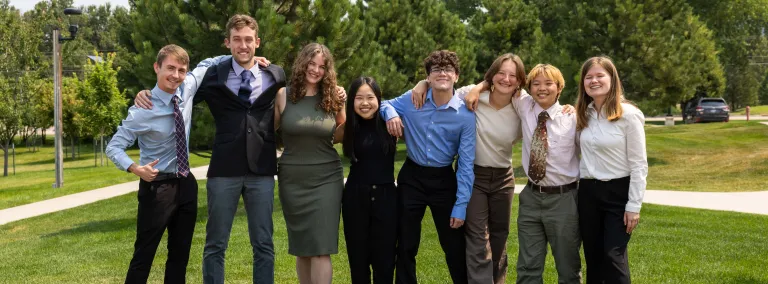
The 2024 Davis-Bahcall Scholars include: (L-R) Colby Routh, Beck Bruch, Nicolette Dame, Huixin Zhang, James Roth, Mackenzie Hollenbeck, Jing Yan, and Ashley Tieszen - standing on green grass outside dressed up for their presentations.
Photo by Stephen Kenny
Scholar Interviews
The SURF Foundation periodically features interviews with Davis-Bahcall Scholars, alumni, and other researchers connected to the Sanford Underground Research Facility. These conversations highlight their experiences in science, research, and education—and the paths that led them there.
Explore the stories below to learn more about the people behind the science, as they reflect on their journeys and the impact of programs supported by the SURF Foundation.
All information in scholar biographies is accurate at the time of publication.
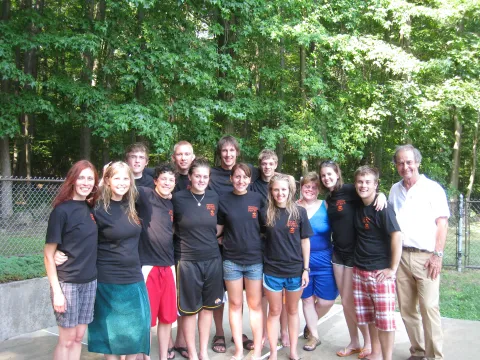
Former Davis-Bahcall Scholar, Dr. Bryce Frentz, reflects on his career in physics and data science, 15 years after his STEM focused globetrot.
There is a point in the career of any science student when they come to the edge of human knowledge—when learning what is already known gives way to exploring the vast expanse of the unknown. For Bryce Frentz, that moment came in 2010 at Italy’s Gran Sasso National Laboratory, where he visited as a Davis-Bahcall Scholar.
“I asked a question following a lecture and the professor just looked at me, and he was like, ‘You know, that's such a good question. Nobody knows the answer to that,’” Frentz said.
The moment made an impression. “It was a real crystallization that there's so much I don't know and there's still so much research actively being done that I could contribute to.”
One of the goals of the Davis-Bahcall Scholars Program is to provide pivotal moments like this. Each summer, the program takes students across the country—and abroad—on tours of national laboratories, universities, and research facilities. Along the way, scholars gain hands-on exposure to the world of scientific research and inspiration for future careers in science, technology, engineering, and math (STEM). For Bryce Frentz, a graduate of Sioux Falls Washington High School, taking part in the 2010 scholar program helped define the rest of his career.
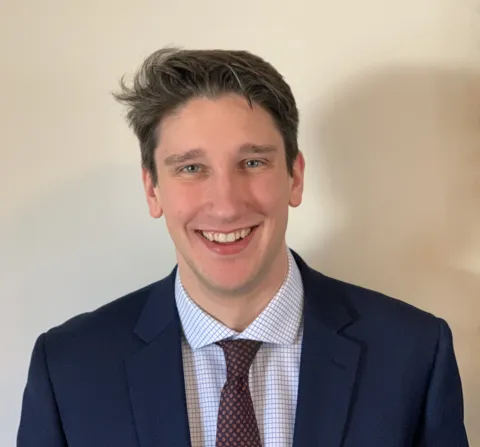
“In some ways, my whole life afterwards, you could say, has been an ambassadorship of the Davis-Bahcall program. The things that I learned, the knowledge I gained, the things that I've gone on to do, I know that a lot of that wouldn't have been possible,” Frentz said.
It wasn’t long before Frentz stepped into the expanse of the unknown and began contributing to world-class science. His academic journey took him through Concordia College, where he earned a degree in physics, and then to graduate school at Notre Dame where he studied how stars form elements. That research led him back to the Sanford Underground Research Facility (SURF), where he joined the Compact Accelerator System for Performing Astrophysical Research (CASPAR) experiment (read more in this 2017 article).
“It very much was a full circle moment for me. Some of the things that I saw in the planning stages as a Davis-Bahcall Scholar in 2010 came to full fruition by the time I was working on my Ph.D. in CASPAR. The scholars program gave me a personal connection to SURF. It felt close to home and very rewarding to come back and kind of close that loop,” Frentz said.
Work on SURF’s underground particle accelerator, CASPAR, is an education all its own. Students take a hands-on approach: not only reading and interpreting data but also turning wrenches, plumbing vacuum tubes and soldering circuit boards. For Frentz, the experience sharpened his problem-solving skills.
“At CASPAR, we built everything. We had to plan each day and when things weren't working, we had to take apart the accelerator and figure out what happened and diagnose why. We often did this while our professor slept, because it was three in the morning. And so, CASPAR was very much student led and really helped build a strong foundation in a way that I don't think other programs and or other research positions did,” Frentz said.
After earning his doctorate in physics from Notre Dame, Frentz transitioned into industry as a data scientist. Today, he works in corporate finance at Humana. “The work I do now is data analytics and modeling for fraud detection and financial forecasting,” Frentz said.
Frentz notes the analytical skills he picked up during his academic career translate well to industry. “My physics background and work are very unique skill set. It has served me well, and I think will serve pretty much anyone well who makes the transition from academia to industry.”
In 2010, both the Davis-Bahcall Scholars Program and SURF were relatively new. SURF was planning or just beginning construction on the 4850 Level, and the Davis Bahcall Scholars Program, then in its third year, was still taking shape. More than 15 years after its inception, the Davis-Bahcall Scholars Program boasts a long list of accomplished alumni.
“This is a program by which some of South Dakota's best and brightest students, who are arguably among the most qualified, most curious young people, are going to be put in positions where they will be helped along a trajectory into success in STEM careers,” Frentz said. “You're sending people out into the world as more readily equipped ambassadors of South Dakota, and to live up to the the highest ideals to which I think we all aspire to.”
Applications for the 2026 Davis-Bahcall Scholars Program are now open. The program, run by the Institute for Underground Science at SURF has built a solid track-record of inspiring the next generation of STEM leaders. Read past scholar interviews here.
Significant financial and in-kind support for this program are provided by South Dakota Science and Technology Authority, Black Hills State University, First PREMIER Bank, and the South Dakota Space Grant Consortium. The program has also received support from private donors through the SURF Foundation, which has helped keep this opportunity strong for South Dakota students.
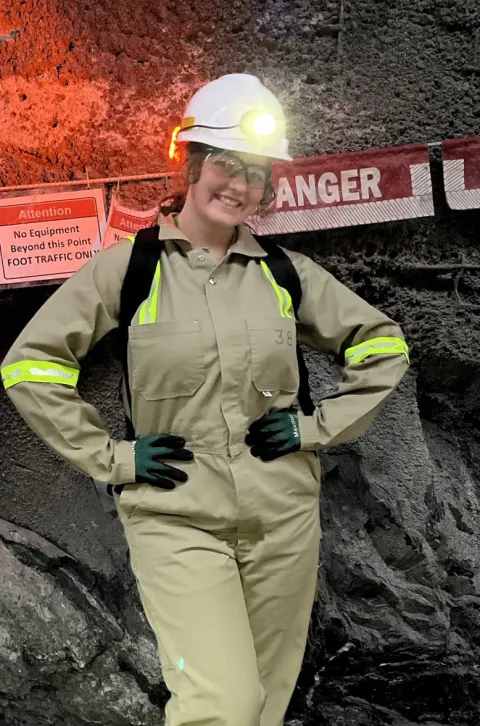
Aerospace engineering student Nicolette Dame, a 2023 Davis-Bahcall Scholar from the University of North Dakota, reflects on how the program sparked her confidence, creativity, and commitment to scientific research and outreach.
How did participating in the Davis-Bahcall Scholars Program influence your decision to pursue aerospace engineering and engage in undergraduate research?
Participating in Davis-Bahcall helped me see and learn real-world applications of physics and gave some insight into what I would be learning in my college courses. It also gave me the confidence to pursue undergraduate research. At first, I was intimidated because I didn’t really know my advisor and was nervous about working with him. But my experience with Davis-Bahcall helped me get used to meeting new people and having meaningful conversations. It even helped me connect with my advisor once I found out he was working on the DUNE project. We had a great conversation about the physics class with Dr. Drew Alton and the time we spent at SURF.
Can you share a moment from your Davis-Bahcall experience that helped shape your confidence or vision for a future in science?
The presentations at the end of the trip really boosted my confidence in doing research and presenting in front of people. I also loved learning with Gina Gibson, SURF’s first Artist in Residence and program coordinator. She helped confirm for me that you can be creative in STEM and that creativity and science go hand in hand.
Now that you're conducting undergraduate research at UND, how do you see the Davis-Bahcall program showing up in your work ethic, skills, or mindset?
A key skill I gained during Davis-Bahcall was learning to listen and absorb information before asking questions. That’s something I rely on heavily now. I dove into a lot of new experiences this year, and being able to listen, process, and ask the right questions has been essential, far more than I realized it would be.
What would you say to someone considering supporting the Davis-Bahcall program and how did it make a difference for you personally and professionally?
I would wholeheartedly encourage supporting the Davis-Bahcall program. It gave me an opportunity I never would have had otherwise to learn science in the real world, meet people from different backgrounds, and understand that not everything goes as planned. Professionally, it helped me make meaningful connections, including with my research advisor. Personally, it reminded me to step back and embrace creativity and expression. Before the program, I never would’ve believed how much of a lasting impact it would have.
Looking ahead, how has the Davis-Bahcall Program helped set the foundation for your long-term goals in aerospace or space exploration?
I want to continue doing research throughout my undergraduate degree and beyond, especially to help advance the space and aerospace industries. Davis-Bahcall helped me see the real-world applications of research. It not only showed me how much work research can be but also how fun and rewarding it is.
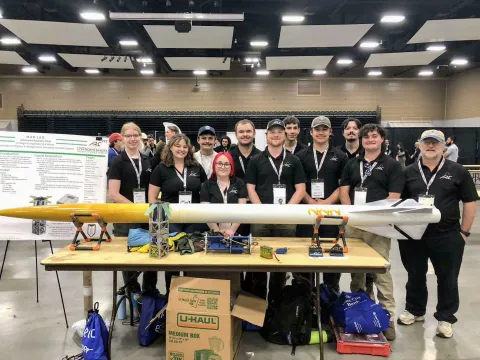
You mentioned leading a rocketry team trip to Texas. What skills or confidence from the Davis-Bahcall program helped you take on that leadership role?
If I hadn’t participated in Davis-Bahcall, I probably wouldn’t have had the confidence to apply for a team lead position. I joined the UND Advanced Rocketry Club to meet people and gain some experience, but when they asked for team lead applicants, I decided to go for it. During the interview, I shared stories from Davis-Bahcall, which helped build my confidence. Later, when we were in Texas, the ability to talk with a wide range of people about our project was incredibly valuable and that’s something Davis-Bahcall helped prepare me for.
As a young woman in STEM starting an AIAA chapter and planning a Women in Science Day, how has your experience with Davis-Bahcall shaped your approach to outreach and mentorship?
Davis-Bahcall exposed me to many different outreach techniques. While visiting labs, we saw a variety of ways people shared their work, from classroom-style presentations to informal dinners. That experience showed me there’s no one “right” way to help people learn. Now, as I work on outreach on a college campus, I draw on that experience to connect with a wide range of people in ways that resonate with them.
What’s next for you? As you continue your journey in aerospace engineering, what projects, opportunities, or goals are you most excited about pursuing in the year ahead?
I am most excited about my opportunities with rocketry and AIAA. I am now the vice president of the Advanced Rocketry Club and I am looking forward to increasing our membership and outreach on campus and in our community. We are also working on starting a Design, Build, Fly group with AIAA, and we are hopeful that it will help more aerospace and mechanical engineering students, myself included, find their place on campus and help decided what they want to do in their career.
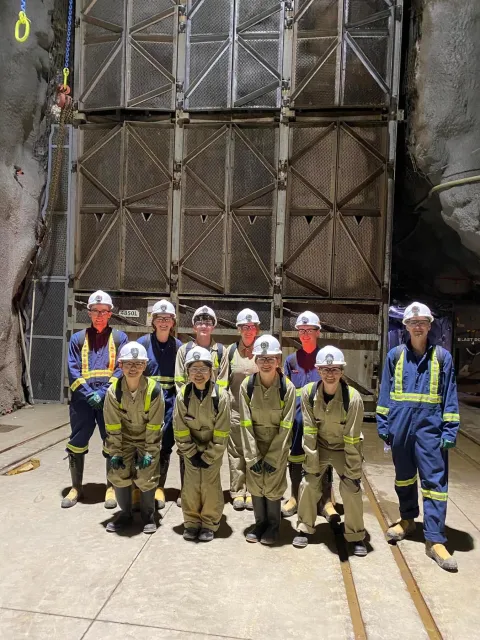
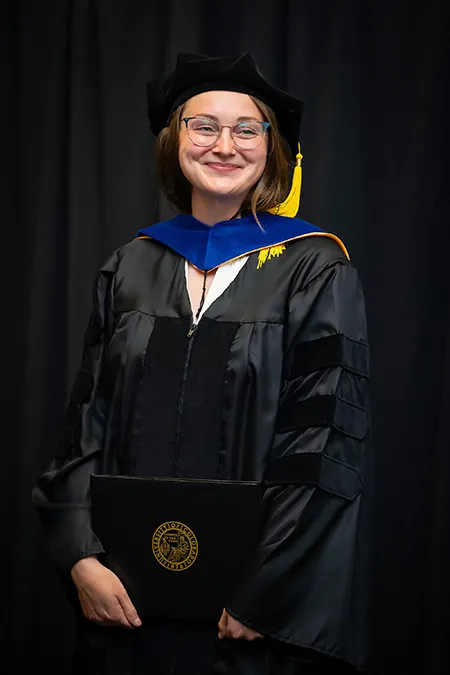
In this first installment of the SURF Foundation’s new interview series, we hear from Madison Jilek, a recent Ph.D. graduate and 2014 Davis-Bahcall Scholar, as she reflects on the early experiences that shaped her path toward a future in scientific research.
Can you tell us about your current research and what scientific questions you’re most excited to be exploring right now?
I just wrapped up my Ph.D. research and graduated on May 8! During graduate school, I studied tiny bits of matter called semiconductor nanocrystals. Specifically, I wanted to develop our fundamental understanding of how these quantum-confined materials interact with light. The work I’ve been doing is all “basic science”, which is fun because it’s primarily driven by curiosity. To work on these materials, in particular, is exciting because I can already see how they’re being implemented in new technologies—like displays, new types of lasers, quantum computing, solar energy and fuels, and biological imaging.
How did your experience as a Davis-Bahcall Scholar influence your path toward a career in chemical physics and research?
As a high school student, what it means to “do science” can seem pretty obscure. Not a lot of people regularly interact with scientists doing science. Even though I liked my science classes, I had little idea of what it meant to be involved in research. Starting to do research with Mr. Stephen Gabriel, my high school physics teacher, and participating in the Davis-Bahcall Scholarship really opened up my eyes to the world of scientific research. Through Davis-Bahcall I met real scientists, visited real labs (around the country and abroad), and learned about the cutting-edge questions they’re exploring. I was inspired by what I was seeing, and I knew I wanted to become a part of that world.
Was there a moment during the Davis-Bahcall Scholars program that changed the way you thought about science or your place in it?
One particularly memorable moment was when a physicist I met said that their college textbook was already outdated because it introduced the “unsolved” Solar Neutrino Problem—a scientific question which was discovered because of the work that John Bahcall and Ray Davis had done at the Homestake Mine—and then explained that this problem had been solved since then, during my lifetime. It was a reminder that researchers are still answering questions about our universe, which contrasted with my previously more static view of science. It was also very inspiring to visit local research labs at SURF, BHSU, and Mines. There, I saw cutting-edge research happening in (or, under) my backyard. It was eye opening to recognize that opportunities to get involved in science were all around me.
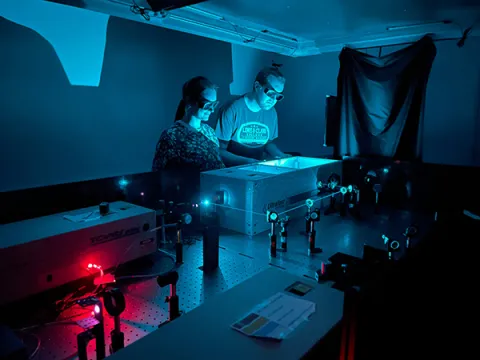
What advice would you give to a high school student who is interested in science but unsure if they belong in a lab or research setting?
I’d recommend that students get involved in research whenever and wherever they can. Being a researcher is a unique type of job, and you won’t know if you’ll like it until you do it. See if your teachers have any ideas or connections!
As a scientist—and now as a mom—how has your view of science education changed? What role do you think programs like Davis-Bahcall play in shaping the next generation of STEM leaders?
Everyone is born curious. But today, with the answer to almost everything just a Google search away, it can be difficult to exercise and cultivate our curiosity and critical thinking. It’s so important that young people have the chance to do this. That’s what makes STEM education and programs, such as Davis-Bahcall, so important.
When you think about the future of your field, what gives you the most energy or hope?
I look around me and I see so many incredibly bright, collaborative, adaptive, hard-working people who are passionate about their work. It’s a blessing to be inspired by your colleagues and your work.
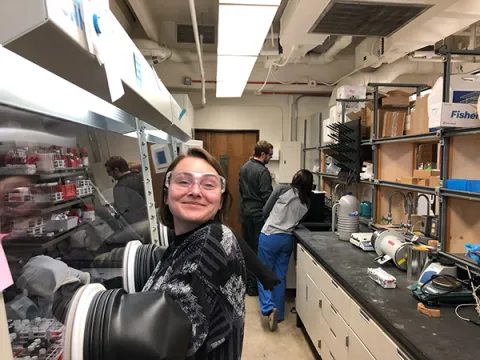
The Foundation supports SURF's mission to advance world-class science and inspire learning across generations. As the philanthropic arm of SURF, the Foundation builds strong relationships around the globe and opens doors for public and corporate contributions to support SURF’s mission. The Foundation, a registered 501(c)(3) non-profit organization, raises funds to support SURF programs and initiatives.
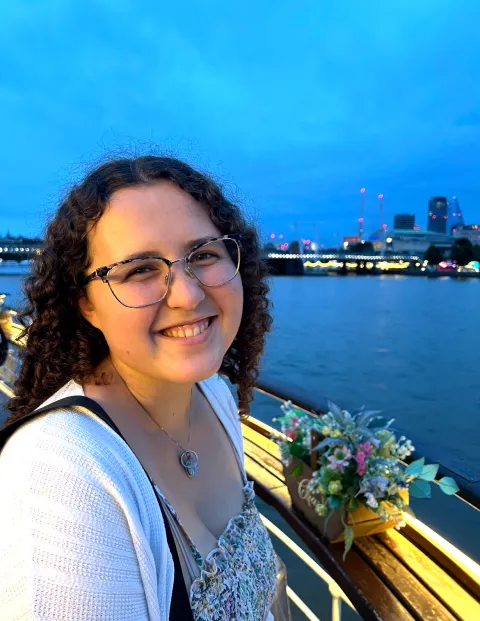
A 2023 Davis-Bahcall Scholar, Grace Davis, is already tackling big research problems in her university studies.
magine it’s 1978. You are a Styrofoam coffee cup at a family picnic at Roughlock Falls in Spearfish Canyon, near Lead, SD. A child decides to set you afloat over the waterfall. You bob near the surface for a short time, before tumbling over the edge to be smashed into small pieces on the rocks below. You begin the long journey downstream, towards the ocean.
Now imagine it’s 2025. You are the same coffee cup—and small parts of you are still strewn across those rocks, from the pristine waters of Little Spearfish Creek all the way to the sediments of Lake Oahe on the Missouri River. You haven’t yet reached the Gulf Coast, but rest assured, someday you will.
This is because polystyrene, sometimes trademarked as Styrofoam, lasts a long, long time in the environment. It can take up to 500 years to break down.
The challenge of cleaning up billions of bits of polystyrene strewn into the environment over the decades is one of the things that drew Grace Davis to study chemistry.
In 2024, Davis landed a prestigious summer research internship at Cambridge University, working under Dr. Bart de Nijs, who leads the research group Physics for Sustainable Chemistry. Her project explored using gold nanoparticles to help break down polystyrene so it can be recycled.
Grace Davis poses in Rome in 2023 during her travels with the Davis-Bahcall Scholar Program.
“The goal of my project was to try to find a way to use lower-energy light to photocatalytically degrade polystyrene,” Davis said.
Her trip to Cambridge was made possible through a competitive application process she undertook as a freshman at the California Institute of Technology. That effort earned her a spot in the Physics 11 course and covered the expenses for her internship in the United Kingdom.
The research Davis undertook as a sophomore chemistry major was anything but sophomoric. Picking up where a postdoctoral scholar had left off, her work required a deep understanding of subjects ranging from chemistry to physics, materials science, and cutting-edge nanotechnology.
The project aligned with a passion for making a difference in the world—a passion ignited during her time as a Davis-Bahcall Scholar in 2023 and fueled by her studies at Caltech.
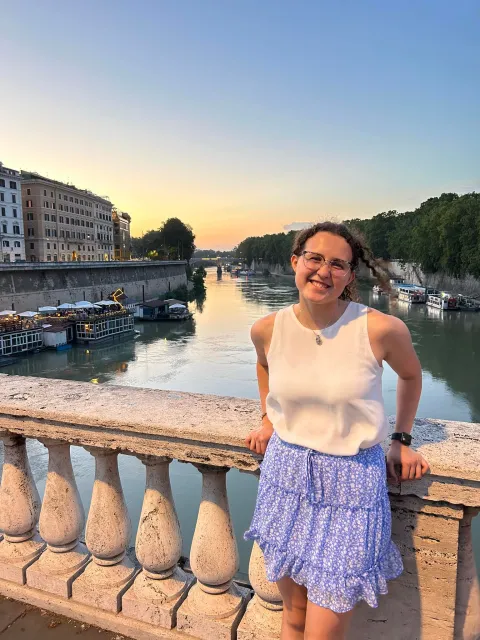
Grace Davis poses in Rome in 2023 during her travels with the Davis-Bahcall Scholar Program.
“I wanted to do something that could address a problem I saw in front of me,” Davis said. “The Davis-Bahcall program and my time at Caltech taught me there are so many opportunities to use the power of science to do so many things. I decided I wanted to use that power to make an impact on the world today.”
Davis grew up on her family’s farm near Elkton, South Dakota. Her love of STEM began as a child. “I have always seen infinite possibilities in the world around me, from the farthest star to the smallest particle,” she wrote in an essay that accompanied her 2023 application to become a Davis-Bahcall Scholar at the Sanford Underground Research Facility (SURF).
Davis spent five weeks in the summer of 2023 participating in the Davis-Bahcall Scholar Program now hosted by the Institute for Underground Science at SURF. The once-in-a-lifetime, all-expenses-paid opportunity connects science-curious students with peers and mentors while exploring the modern world of STEM research. The program also aims to demystify STEM careers by exposing students to what professionals do every day.
“I cannot overstate the impact of the Davis-Bahcall Scholar Program on my life,” Davis said. “Growing up in rural South Dakota, I had little exposure to scientific research. I had no idea what it was like. There weren’t a lot of people I knew in the career field I really wanted to go into.”
Davis said her time in the 2023 program illuminated future possibilities and gave her the confidence to achieve her dreams.
“To have the opportunity and the funding to visit these labs on the frontier of science, where cutting-edge research was being done, and to actually talk to the people doing it, was transformational for me,” she said. “I gained the confidence to leave my entire life in South Dakota and go out to California to study.”
That confidence is part of the message Davis wants to share with those considering applying for the 2025 Davis-Bahcall Scholar Program. The application deadline is Friday, Jan. 17, 2025—apply here.
“Don’t put any limits on what you want to do,” Davis said. “Don’t be afraid to apply for these things, and don’t be scared that you’re not going to be enough. You can do anything. The sky is the limit, especially in this era. The biggest universities are really starting to realize the untapped potential of people from underrepresented backgrounds. Being from South Dakota is almost by definition an underrepresented background, right? Because historically, we haven’t had the opportunities we have today.”
Davis is living proof that students from small-town South Dakota can become top-tier researchers tackling the toughest problems of the future. Her work this past summer is yielding promising results in the ongoing effort to find new ways to break down polystyrene.
“One of the new postdocs in the group is continuing to work on my project because I did get some exciting preliminary results,” Davis said.
She remains in contact with the research team, and with any luck, the work she contributed to could someday help clean up all those broken polystyrene coffee cups, containers, and packing materials slowly making their way to the sea.
The Davis-Bahcall Scholar Program is hosted by the Institute for Underground Science at SURF. Major sponsors who make the program possible include First PREMIER Bank, Black Hills State University, the South Dakota Space Grant Consortium, and the South Dakota Science and Technology Authority. Those interested in supporting the program can learn more here. An article on First PREMIER Bank and its ongoing commitment to the program will be shared in the “Deep Thoughts” newsletter soon.
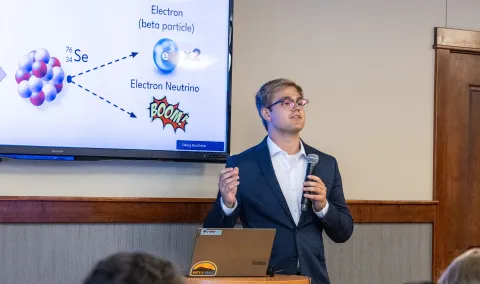
Connor Matthies, gives a presentation at Black Hills State University during his time as a 2023 Davis-Bahcall Scholar.
Photo by Stephen Kenny
This article, by South Dakota State University, highlights the research of Connor Matthies, a 2023 Davis-Bahcall Scholar at SURF.
“Cool your jets” might have been advice your mother gave you when you got a little hot under the collar.
Connor Matthies holds a scale model of the jet array that will be used in his Future Innovator of America project. Matthies is testing a couple different designs for using jets of air to cool a heated surface.
Photo courtesy of SDSU
For Connor Matthies, it’s a science project — in a sense, anyway. Matthies, a senior mechanical engineering major from Hartford, is one of eight Future Innovators of America this school year.
This is the fourth class of Future Innovators of America, which is chosen by the Jerome J. Lohr College of Engineering at South Dakota State University. Recipients are awarded $5,000 with $4,500 as a stipend and $500 to cover the cost of lab supplies or travel to disseminate the results of their project.
The fellowships were created to provide unique research opportunities for undergraduate students in the college. Any student is eligible to apply as long as they are attending full time and have a GPA of 3.0 or higher. Application deadline was Nov. 5.
Each student worked with a potential project mentor, who must be a faculty or research staff member, to develop and submit a research plan that entails learning by doing.
Matthies’ project, conducted under the supervision of associate professor Gregory Michna, is “Experimental and Numerical Investigation of Swirling Impinging Jet Arrays with Novel Geometries.” The simple explanation is Matthies is testing a couple different designs for using jets of air to cool a heated surface.
This is a common practice in industry, particularly in the textile and aerospace industries as well as for electrical component manufacturers and high-performance data centers.
Creating a unique experiment
What makes Matthies’ research unique is he is adding a swirl to the array of 25 jets blowing room-temperature air on a sheet of heated stainless steel.
An array of jets adds uniformity to the cooling process. Matthies’ experimentation will look at several variables — swirl direction, flow rates and the amount of swirl. The number of jets and jet size will be fixed.
In one test, the air will all swirl one direction, either clockwise or counterclockwise. In the other test, a checkerboard design will be used — the air flows clockwise from one jet while in the adjoining jet the flow is counterclockwise.
Benefits from summer REU program
Matthies started his project with literature review in spring 2025. He took summer off, kind of. He participated in a Research Experience for Undergraduates program at the University of Central Florida, where the focus was “Advanced Technologies for Hypersonic Propulsive, Energetic and Reusable Platforms.”
Part of that hands-on research training involved simulating carbon dioxide flow and temperature profiles.Certainly a bingo for his Future Innovator project. “That really helped prepare me for my FIA research,” Matthies said. He already had an interest in computational fluid dynamics and heat transfer. The 10-week REU program gave him a chance to pursue it more deeply.
Michna noted, “His CFD skills had improved. More importantly, he came back with a much better understanding of the research endeavor and of the work necessary to make new discoveries. He hit the ground running upon returning to Brookings in August.”
Lessons learned from FIA project
Unlike a class assignment or an industry-directed project, Matthies’ Future Innovator project gave him great flexibility in how to structure it.
That was both the most challenging and most enjoyable aspect, he said. “Dr. Michna is there as an adviser and to course-correct, but I have the responsibility of the whole project. The design of an experiment is something I’ve never had to deal with. I have to be able to think of every aspect and then solve all the problems.
“The design decisions are novel for both of us, so I’ve had to learn the processes myself and be able to defend it,” and when that happens there is a lot of satisfaction, he said.
And a lot can be learned when the processes don’t go well.
For example, Matthies initially tried using his home 3D printer to create the five-by-five array of jets. That was a short-lived effort. Next try was using a 3D resin printer in associate professor Saikat Basu’s mechanical engineering lab. Then the model needed to be reprinted to strengthen the base to keep it from tearing away from the printer.
The 10-hour process of printing the jets is now in the past tense. Next up is creating a polycarbonate shroud from which a fan will blow air through the tubes to the array of jets. He expects to be able to run the heat transfer tests this spring and wrap up his report in time for graduation May 9.
Senior design project: Building USA drone
It will be a busy spring for Matthies, who freely admits, “I don’t have a lot of free time.”
In addition to 10 hours per week with his Future Innovators project, Matthies is president of the college’s Joint Engineering Council, is active in the SDSU Robotics Club, has a senior design project to make a USA-made drone, and is a member of a mechanical engineering class building a drone adept at lifting.
The senior design project, in which he is teamed with mechanical engineering classmates Ryan Risacher, Dayton Downing and Braxton Hahn, is being conducted under the supervision of Todd Letcher, an associate professor in mechanical engineering. The South Dakota Space Grant Consortium-sponsored project is in response to a December ban that the U.S. government placed on federal agencies wanting to buy drones.
They can no longer be purchased from Chinese firms, and China had been the leader in drone manufacturing, Matthies explained.
The students intend to have a 5-pound drone built in time for the Engineering Expo at SDSU April 28. But the end goal is to see if USA-made drones could be a viable business, Matthies said.
Competing for a $6.5 million prize
The other drone is part of the DARPA (Defense Advanced Research Projects Agency) Challenge, a federal contest with a $6.5 million prize that is primarily attracting industry contestants, Matthies said. The objective is to build a drone that can lift four times its weight and fly a course, he said.
Concept submission deadline is May 1 with finalists invited to test their drones in June.
Matthies is one of 12 students working on the project, which is a class taught by Letcher. “It felt like a good fit since we’re already designing a drone,” Matthies said. They have their work cut out for them. Students were still brainstorming designs as of Jan. 20.
But don’t discount the group’s chances. Matthies’ higher education experience has been a charmed existence, beginning with selection as a Davis-Bahcall Scholar after graduating from West Central High School. That program is operated by the Sanford Underground Research Facility for incoming college freshmen and sophomores.
He spent two semesters with The Pride of the Dakotas Marching Band. It coincided with the football team’s national championships and the band’s trip to the Macy’s Thanksgiving Day Parade.
“It’s been a whirlwind and a tremendous experience. I wouldn’t change it for the world,” Matthies said of his college years.
After graduation May 9, he plans to work in either the aerospace or heat transfer industries.
DAVIS-BAHCALL SCHOLAR PROGRAM
The Institute for Underground Science at SURF’s Davis-Bahcall Scholars Program, offers students a once-in-a-lifetime learning opportunity that takes them around the world of modern scientific research.